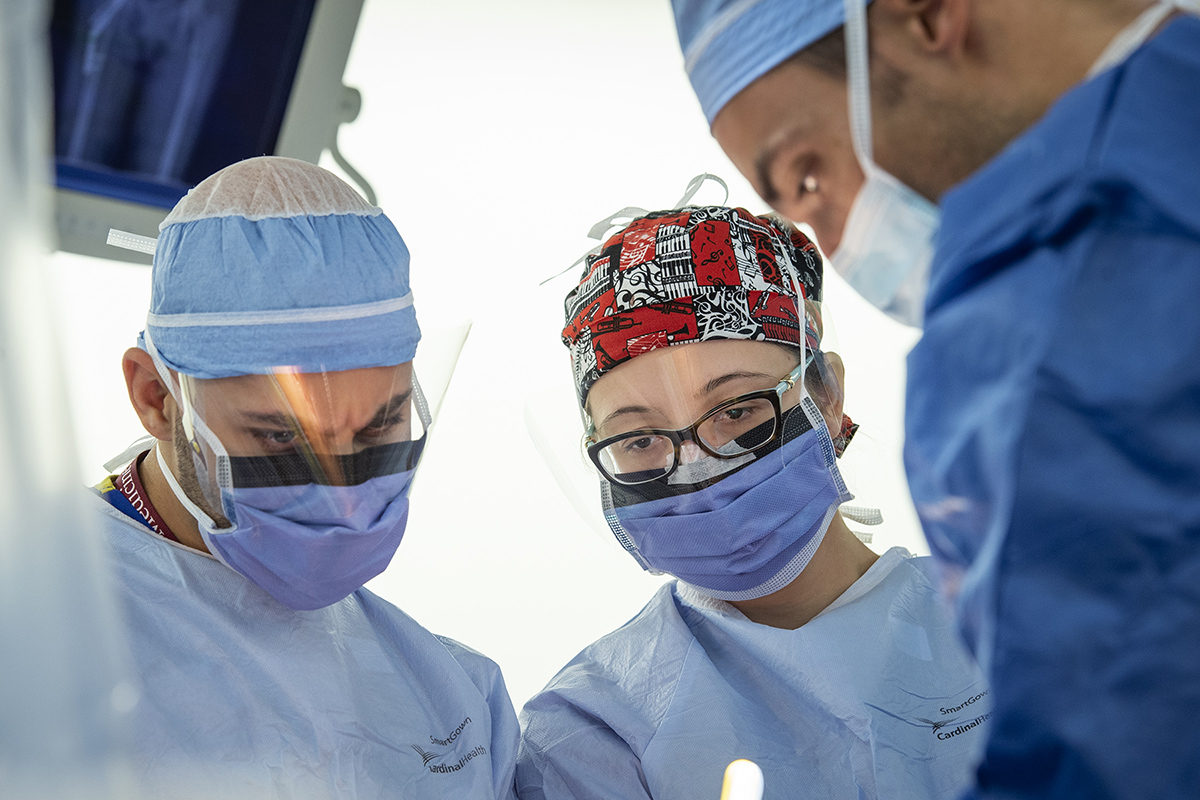Educating future frontline health care professionals
May 28, 2020
Share

Health care professionals, including doctors, nurses, and therapists, are some of the frontline workers being hailed as heroes for their efforts supporting communities during the COVID-19 pandemic. For students entering these professions, the current crisis has posed challenges to course requirements, potentially affecting graduation timelines, in a context where frontline professionals are needed more than ever before.
As of June 1, approximately 200 students from the Schools of Medicine, Nursing, and Rehabilitation Therapy at Queen’s will return to local Kingston hospitals to complete clinical placements and clerkships that are key to their future frontline work.
Following the outbreak of the coronavirus in March, leaders from Queen’s, in consultation with Kingston Health Sciences Centre (KHSC) and Providence Care, made the difficult decision to temporarily suspend student placements as part of the ramping down of services and to preserve resources. Now, because of several factors, including a particularly low prevalence of the virus in the Kingston region, local teaching hospitals and centres are now able to slowly reintroduce students from Queen’s into the clinical environment.
“We have been keen to have students in the Faculty of Health Sciences return to their clinical placements,” says Richard Reznick, Dean, Faculty of Health Sciences. “Not only do they play an important role in the delivery of health care at our hospitals, they will be re-entering in a very unique context that presents incredible learning opportunities.”
The university worked closely with the regional hospitals and KFL&A Public Health to ensure that the students will be reintroduced to the system in a way that prioritizes safety.
“We are working with our partners in education and have developed safety measures to make sure students are phased into the hospital setting in a way that will keep them, our patients, and our staff as safe as possible,” says Michael Fitzpatrick, Chief of Staff at KHSC.
All students who are returning to complete their clinical placements and clerkships are required to self-quarantine in Kingston for two weeks prior to starting at the teaching hospitals. While they are on-site at KHSC and Providence Care, students will follow staff safety policies and procedures, including completing training on current COVID-19-related protocol, adhering to the staff screening process, and conserving personal protective equipment.
Additionally, students will be required to self-monitor for symptoms throughout their programs. They must be symptom-free for two weeks in order to participate in any in-person activities.
“As an academic health sciences centre, students play a vital role in the care of our patients, clients and residents. We’re looking forward to welcoming them back to our hospital and community programs safely,” says Allison Philpot, Director of Medical Administration at Providence Care.
Once-in-a-Lifetime Learning Opportunity
While it may not be business-as-usual, the clinical environment will offer a once-in-a lifetime opportunity for students, many of whom are close to graduating and in search of permanent employment.
"Having the opportunity to complete my clinical placement means that I can work towards graduating on time, allowing me to use the nursing skills I've learned at Queen's to compassionately care for patients and families,” notes Bayley Morgan, School of Nursing, Class of 2020. “I am eager to join our heroic nurses and health care workers in supporting those affected by illness and injury, and in contributing to a safe and respectful practice environment."
The students look forward to returning to their clinical settings and credit university and hospital administration for developing creative solutions to allow them to meet their educational goals, while keeping their safe return to clinical duties at the forefront of efforts.
"The Class of Meds 2021 is eager to return to help serve the health care needs of Kingstonians and is confident that the reintegration into the clinical learning environment will go smoothly,” says Josh Gnanasegaram and Rae Woodhouse, Class of 2021 Co-Presidents, School of Medicine. “We see these coming months as a pivotal time in the re-shaping of health care systems as a result of the COVID-19 pandemic, and we are excited to be actively involved in that process.”
The reintroduction of students to clinical placements is part of a gradual and evolving re-opening of in-person activities that is being led by Queen’s University administration.